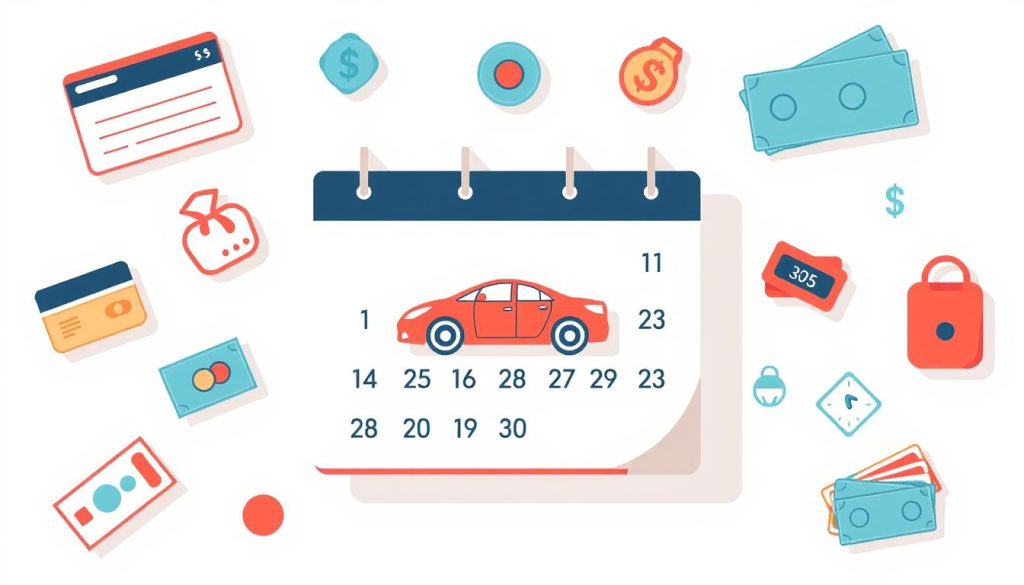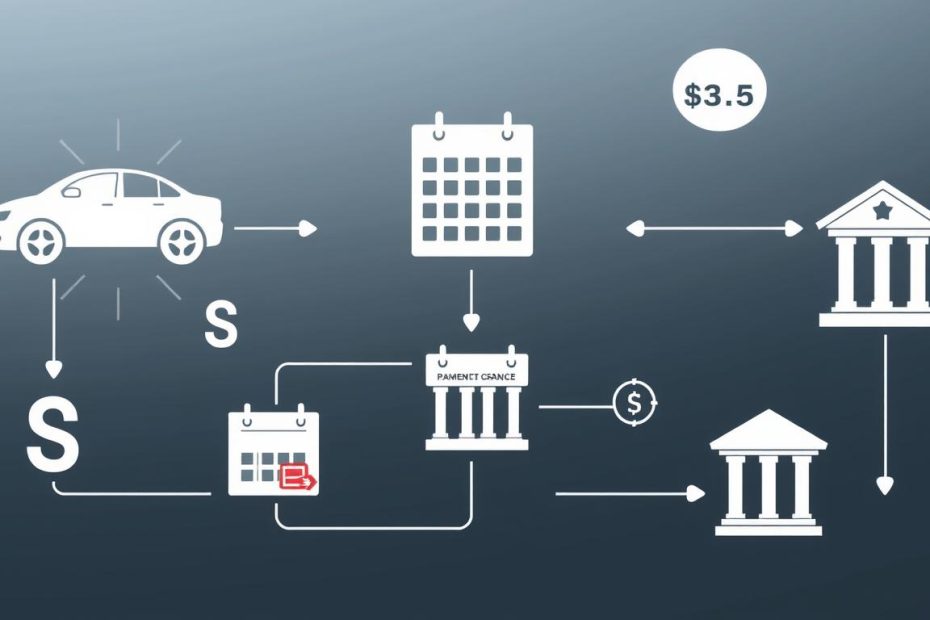When you own a car, handling car insurance payments becomes vital. It’s important to know how insurance premiums work. This knowledge helps you keep your coverage and stay within the rules. Understanding how to pay your insurance after you sign the contract is key.
Your insurance coverage starts with your first payment. Over time, knowing when your premiums are due keeps your car protected. If your situation changes, like getting a new car, your premium may change too.
Besides regular payments, you might deal with cancellations or paying for repairs. Deductibles and excess fees also affect what you pay. Insurance companies offer different ways to pay. They follow state laws and important insurance rules.
Insurance policies can adapt to life’s changes. This could mean filing a claim right after an accident or dealing with several payments for damage. Insurers and policyholders work together. They follow the contract’s rules and the principle of making you whole again.
Introduction to Car Insurance Payments
Entering a car insurance agreement means one must clearly grasp the understanding of insurance payment terms. These rules govern when and what you need to pay and what happens if you’re late. Typically, you need to pay every six to twelve months to keep your coverage active.
To help you keep up, insurers offer digital tools for managing car insurance payments. Setting up automatic payments, for example, can keep your coverage active. This is crucial in certain states, like Pennsylvania, where the law demands continuous insurance.
Adding extras to your policy or updating it can change your premium. This is a key part of the auto insurance billing process. It’s necessary to ensure your policy stays updated with your current needs and vehicle use.
It’s important to understand all your coverage options too. Some policies might not cover everything, like damage from collisions or theft. Knowing what your policy includes helps you make smart payment decisions and keeps you protected on the road.
Understanding Your Car Insurance Payment Schedule
Once you sign your insurance contract, it’s key to get the hang of your payment schedule. This ensures your insurance doesn’t lapse and you avoid fines. Knowing when and how to pay, whether it’s monthly, quarterly, or yearly, makes things less stressful.
Initial Payment and Activation of Coverage
Making the initial payment starts your coverage. This first payment info is on the policy’s declaration page. It’s part of your contract. Right after this payment, your coverage kicks in. It protects you from the financial damages of road accidents.
Insurance Premium Due Dates and Reminders
It’s crucial to remember when your premiums are due. Insurers remind you by mail or electronically. Staying on schedule keeps your coverage active and legal. Missing a payment might lead to extra fees or even losing your insurance.
Managing Premium Adjustments for New or Replacement Vehicles
If you get a new car or replace an old one, tell your insurance company right away. You have 30 days. The kind of car and how you use it can affect your payments. Promptly adjusting your policy ensures you’re still covered and following your contract.

Being ahead of the game with your car insurance payment methods makes a big difference. Regularly check your policy and talk openly with your insurer. This way, you’ll manage your payments well and keep your insurance in check.
How Car Insurance Payments Work After Signing the Contract
After signing up for car insurance, it’s important to get a grip on how car insurance payment methods work. You should also mark your insurance premium due dates on your calendar. This ensures you stay covered without interruptions. Insurance companies let you pick from paying monthly, every three months, or yearly. Sticking to this schedule stops your policy from ending early.
Different car insurance payment methods are available today to fit what you like. You can pay online, write a check, or even go to the office. Setting up auto-pay is a smart move. This way, you never forget a payment and keep your coverage active without a hitch.
If you move or change who drives your car, your policy rate might change. These updates usually don’t cause a hassle. Yet, it’s best to talk to your insurance provider quick. This helps avoid any surprise costs.
Keeping up with your policy’s details is also key. Say, a change in how you use your car could lower your payments. Talk to your insurer if something in your life changes. It could make your car insurance payments better match your current situation. This step can save you money and make sure your policy meets your needs.
Checking your policy and payment terms regularly helps keep your insurance in line with your life. This approach offers peace of mind. It ensures you’re well-protected as you journey through life.
Variations in Insurance Premium Processes
Insurance premiums are calculated using many factors that affect your payments. Knowing how these factors work is key to understanding policy cost changes. For example, the price you pay for car or life insurance depends on details like the Declaration Page and Exclusions.
Factors Influencing Premium Calculations
The Declaration Page lists important info like who’s insured, what’s covered, and policy limits. For car insurance, it also shows the vehicle, premium amount, and deductibles. In life insurance, it tells you the policy’s face amount and the insured person’s name.
Insurers must decide if coverage is for named-perils or all-risk. They also consider Exclusions, like flood or wear and tear. Lastly, Conditions detail the insurer’s obligations, like needing a proof of loss or protecting property after damage.
Understanding Short Rate Cancellation Fees
If you end your insurance policy early, you might face short rate cancellation fees. These fees compensate insurers for the risk of a policy ending suddenly. It’s crucial to understand these fees and their effect on your finances.
Insurance Points and Accident History
Your driving history affects your insurance rates. Non-fault accidents usually don’t increase your premiums. But, getting points for violations or at-fault accidents can. Knowing how your accident history influences premiums can help manage your insurance costs.
Being aware of all policy aspects, including Definitions and Riders, is beneficial. It helps when dealing with insurance claims and renewals. This knowledge improves your ability to deal with insurance matters.


